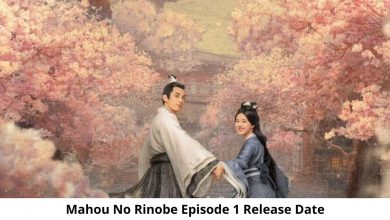CBC’s ‘The Porter’ sheds light on part of Canadian history with ‘energy,’ ‘sexiness’ and ‘fun’
If you want to know what CBC’s historical drama “The Porter” is about, there’s a lot to be gleaned from the television series’ opening minute and 10 seconds.
Inside a bar in 1921 Montreal, the Black patrons sit silent and wary as a white police officer struts around, nightstick in hand, stopping to snatch a bottle of rum from a table. But railway porter Junior Massey (Aml Ameen) grabs the bottle and holds on, staring defiantly at the cop as fellow porter Zeke Garrett (Ronnie Rowe Jr.) hisses a warning: “Junior.”
The danger passes when another cop walks out of a back room counting his bribe money. The officers leave, Club Stardust owner Popsy (Kevin Hanchard) claps his hands and snaps his fingers: a drumbeat thrums, the dance floor fills and the party bursts back into exuberant life.
“I love the way that scene all came together because I feel like it is so many of the different themes of our show in that one piece,” said Marsha Greene, one of the co-creators of the series, which debuts Monday.
“What was beautiful about it,” added director and executive producer Charles Officer, “is that, even in silence, you’re getting a sense of what we feel as Black people when we are in environments that are interrupted by an outside force that actually has no business doing that.
“Before that police officer entered that room, everyone was having a great time. And then when they leave, we get back to our world … We deal with these situations all the time and (it’s) not that they don’t affect us, but we do have to find our way to get back to the joy and get back to living our lives.”
“The Porter” is, at its most basic level, a show about two railway porters and the different ways they react to oppression, as demonstrated in that opening scene, but it’s also a show about Black people simply being.
“Community” and “culture” were two words that came up repeatedly in two Zoom calls, one with key cast members of the show, the other with the creative team.
For R.T. Thorne, an executive producer who shared directing duties with Officer, it was important to go beyond the history to “our multitude of cultures that make up the Black experience in North America … to hear the accents and to almost taste the food and to (hear) the music …
“We didn’t want it to just be a historical documentary,” he added. “We want to give you something spicy as well. We want you to have fun while you’re watching the show.”
The history is where it started, however.
Canadian actor Arnold Pinnock, familiar from series like “Billable Hours,” “Life With Derek” and “Travelers,” was born in England and was “always looking for books that I could read to my parents about the Black experience in this country of Canada … and one of the common denominators that just kept on coming up is these porters.”
Learning that Canadian porters had started the first Black labour union in North America, “it blew my mind. And you always get to that point where you’re like, ‘Oh my God, why didn’t I know about this?’ You’d learn a few things, obviously, about the Underground Railroad, but then that was it.”
Pinnock and fellow actor Bruce Ramsay, who also have roles in the series, developed a pitch for a show about porters in Montreal. Sienna Films, which has produced well-regarded series like “Cardinal,” “Transplant” and “Sort Of,” came on board. Then writers and producers Greene and Annmarie Morais got involved to further develop the project.
In the real history, four porters in Winnipeg, led by John A. Robinson, organized the Order of Sleeping Car Porters in 1917, according to the Canadian Museum for Human Rights.
In the show’s history, Zeke instigates the union in Montreal, although the series was filmed in Winnipeg.
Zeke and Junior are co-workers who fought together in the First World War. They both live in St. Antoine, a Black neighbourhood that, according to the Canadian Encyclopedia, was settled when railway companies emerged in the mid to late 19th century with the concomitant hiring of Black porters.
The porters came from Canada, the U.S., the Caribbean and even farther afield.
Almost all Black men, they worked long hours attending to passengers’ every need, were poorly paid and had to cover the costs of uniforms, the meals they ate on board, even items taken by passengers, from their wages. So they relied on tips to supplement their incomes which, the Museum for Human Rights says, “put porters in a precarious and servile position” — all of which is portrayed in “The Porter.”
But that oppression is just the spark of the story, not the point.
“You’re going to see these men in servitude, (but) this is about their lives,” said Greene, known for “Private Eyes,” “Ten Days in the Valley” and “Mary Kills People.” “We’re showing how complex their lives were outside of being a porter, but also the amount of fight that was in them … we are then and now up against certain barriers, but that doesn’t mean we can’t overcome.”
In fact, despite the difficulties, being a porter conferred status in the men’s own communities. This is conveyed in another scene in the first episode, in which the porters strut through the neighbourhood on their way to work like conquering heroes, as “Pomps and Pride” by Toots and the Maytals plays.
Ameen, a British actor of Caribbean heritage, loves that scene.
“There’s an energy and there’s a sexiness and it’s really, really just powerful and fun. And then Charles (Officer) drops this Caribbean music in there and you’re like, ‘Oh my gosh, like, this is a different world,’” he said.
“They really were the elite of Blacks,” added Loren Lott, a California-born actor who plays Lucy Conrad, an ambitious performer at the Stardust.
For Ameen, who’s appeared in film and TV projects like “Lee Daniel’s The Butler,” “Yardie” and “I May Destroy You,” it wasn’t new to work with a Black-led cast and creative team. But he found it “revolutionary” to explore the stories of men who might otherwise be seen as “two-bit, one-dimensional roles onscreen.”
Canadian actor Mouna Traoré, who plays Marlene, a Black Cross nurse and Junior’s wife, appreciates how well-rounded her own character is. “You get to see her not only starting to pursue a career, but her desire and how it transforms over the season … You see her in love, you see her struggling with lust, and her desire to create something better for her community and for her family.”
She also appreciated that the actors were encouraged “to lift the veil and not code-switch, and speak on camera the way that we actually speak to each other in real life, the way that we speak about white people, the way that we are when we’re not seen through the gaze of whiteness.”
Besides Ameen, Traoré, Lott and Rowe, a Toronto-born actor whom viewers would recognize from his role as Lt. Cmdr. Bryce on “Star Trek: Discovery,” the main cast of “The Porter” includes Toronto’s Oluniké Adeliyi as Chicago gangster Queenie, who tangles with Junior when he starts rum-running; and veteran American actor Alfre Woodard as brothel owner Fay.
Thorne said the producers had an embarrassment of riches to draw on when casting the show, which put the lie to claims he’s heard within the industry of not being able to find the “right” Black talent to fill roles. “We saw so much incredible talent across this country in all different places, just a variety of beautiful faces and talents … So you’ve just got to look.”
It’s a particular point of pride that Woodard, an Oscar-nominated, Emmy-winning actor with a long and varied list of credits, joined the cast. Pinnock reached out to ask her to give a pep talk to the team, “but once she came on and felt the passion and the desire and the willingness of our team to go through fire to get where we need to get … she became part of the DNA for this show and we’re extremely blessed to have her.”
Canada isn’t very good at putting its history on television, let alone its Black history, a failing “The Porter” is doing its part to rectify.
“This speaks to our education systems and our art programs and the things that … tell us over and over again that we haven’t been here or we haven’t been a part of these things,” said Officer. “And I know there’s an audience and there’s a whole generation that’s been hungry for (a show like ‘The Porter’).”
“How does it change the way in which you exist and walk as a young person when you know you have voice, history and agency?” added Morais. “I think you walk straighter … I think you fight harder because the truth of who you are in our history is being revealed to you. And I think it will change lives tremendously.”
JOIN THE CONVERSATION
/https://www.thestar.com/content/dam/thestar/entertainment/television/2024/02/18/cbcs-the-porter-sheds-light-on-part-of-canadian-history-with-energy-sexiness-and-fun/the_porter_walk.jpg)
/https://www.thestar.com/content/dam/thestar/entertainment/television/2024/02/18/cbcs-the-porter-sheds-light-on-part-of-canadian-history-with-energy-sexiness-and-fun/the_porter.jpg)
/https://www.thestar.com/content/dam/thestar/entertainment/television/2024/02/18/cbcs-the-porter-sheds-light-on-part-of-canadian-history-with-energy-sexiness-and-fun/lucy_and_zeke_dancing.jpg)
/https://www.thestar.com/content/dam/thestar/entertainment/television/2024/02/18/cbcs-the-porter-sheds-light-on-part-of-canadian-history-with-energy-sexiness-and-fun/marlene_and_junior_2.jpg)
/https://www.thestar.com/content/dam/thestar/entertainment/television/2024/02/18/cbcs-the-porter-sheds-light-on-part-of-canadian-history-with-energy-sexiness-and-fun/porters.jpg)





